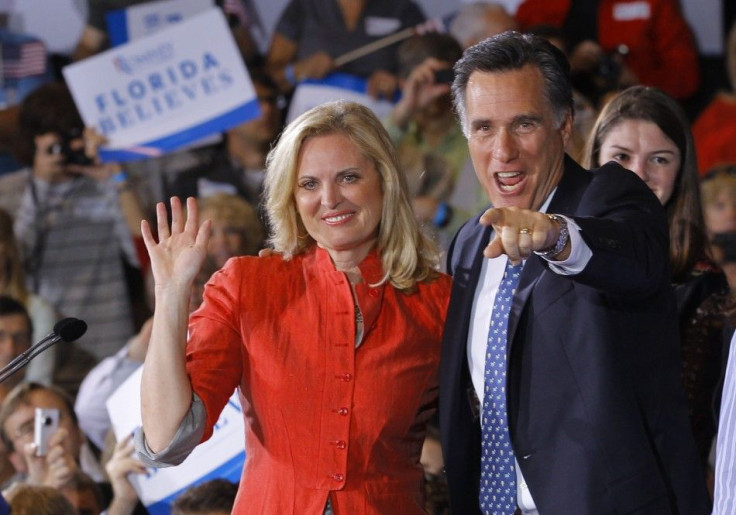Romney Wins Big in Florida Presidential Primary

(Reuters) - Mitt Romney cruised to a blowout victory in Florida's Republican U.S. presidential primary on Tuesday that put him back in front in the fight for his party's nomination to face President Barack Obama and left chief rival Newt Gingrich reeling but vowing to fight on.
With 70 percent of the vote counted, Romney had 47 percent of the vote to Gingrich's 32 percent in the largest of the four Republican presidential nominating contests so far this year.
U.S. television networks projected Romney as the winner just as the last polls closed in Florida.
The victory enabled Romney, the wealthy former Massachusetts governor and private equity firm executive, to rebound from his decisive loss to Gingrich in the January 21 South Carolina primary.
The well-funded and well-organized Romney surged in opinion polls in Florida after aggressively pressing Gingrich in two debates and pounding him with negative advertising.
The campaign for the Republican nomination to challenge Obama, a Democrat, in the November 6 election now tilts in Romney's favor with seven contests in February in which he could win or do well, starting with Nevada on Saturday.
The Florida victory also may widen a rift between establishment Republicans who back Romney and conservative voters who favor Gingrich, a dynamic that could complicate the party's effort to oust Obama in November.
As this primary unfolds, our opponents in the other party have been watching, and they like to comfort themselves with the thought that a competitive campaign will leave us divided and weak, Romney told a jubilant crowd in his victory speech in which he focused on Obama after two weeks of clobbering Gingrich.
But I've got news for them. A competitive primary does not divide us. It prepares us, and we will win, Romney added.
The Florida primary was the fourth in the series of state-by-state contests to pick the Republican nominee. Romney has triumphed in two of the first four contests, having also won in New Hampshire and coming in second in Iowa and South Carolina.
Romney was helped by the millions of dollars in negative television ads against Gingrich that undermined the argument advanced by the former speaker of the House of Representatives that he is the conservative heir to Republican President Ronald Reagan.
Gingrich fought back with ads of his own, castigating Romney as a party insider and elite friend of Wall Street - and called him for all practical purposes a liberal. But Gingrich did not have the same amount of money as Romney, who had used a similar advertising spree to cut Gingrich down to size in Iowa.
It is now clear that this will be a two-person race between the conservative leader Newt Gingrich and the Massachusetts moderate, Gingrich told his supporters after the primary.
The next contest is the Nevada caucuses on Saturday, followed next Tuesday by caucuses in Colorado and Minnesota and a primary in Missouri.
'THIS DOGFIGHT IN FLORIDA'
I think both of them are damaged by this dogfight in Florida, veteran Republican strategist Ed Rollins said of Romney and Gingrich. I've never seen anything quite like it in a presidential campaign.
Winning Florida demonstrated Romney's ability to compete strongly in a major political battleground state with a broad voter base that includes a diverse electorate including Tea Party conservatives, evangelical Christians and Cuban-Americans.
He kept his focus on the U.S. economy and Florida's 9.9 percent unemployment rate, insisting his background as a private equity executive gives him the economic acumen to help the country create jobs.
I voted for Romney. I think he'll create jobs, said Dino De Cicco, 38, of Melbourne Beach.
But the Florida campaign revealed that Republicans still hold doubts about Romney. Conservatives feel he has flip-flopped on some major issues and lacks a spine.
Romney is not a conservative, said Richard Jeske, 66, an Orlando security guard who voted for Gingrich.
These are concerns that Gingrich hopes to take advantage of as he tries to hang on until March when a number of Southern states vote.
The defeat was a dispiriting one for Gingrich, who was unable to recreate in Florida the late surge of support in South Carolina from undecided voters that carried him to a shock victory.
Gingrich is vowing to fight on until Republicans hold their convention to nominate their candidate in late August, a battle he pledges will be for the heart and soul of the conservative movement.
Gingrich supporters hoisted banners at his Florida party that read 46 states to go.
Romney still narrowly trails Gingrich in some national polls. But many analysts believe a double-digit victory in the Sunshine State cements his status as front-runner as the national Republican nomination contest continues.
According to exit polls by CBS, 62 percent of the Republican voters said the economy was the most important issue to them. Romney has campaigned hard saying he is best placed to fix the economy based on his experience as a businessman.
(Romney's) a businessman. He knows how to make money. If he makes promises, he'll keep them, said Frank Lobue, a retired utility company employee, who voted in St. Petersburg.
Voters also said in exit polls that they very concerned about picking a candidate who could beat Obama.
(Additional reporting by Ros Krasny, Sam Youngman, Jane Sutton and David Adams; editing by Mary Milliken)
Politics Barack Obama Election 2012tton and David Adams; editing by Mary Milliken
© Copyright Thomson Reuters 2024. All rights reserved.






















